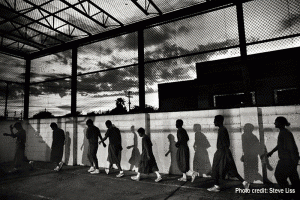Over the past few years, a growing body of research reveals that the use of solitary confinement for youth held in detention facilities can be damaging, especially for those youth who already struggle with mental illness. The use of isolation greatly increases the risk of self-harm and even suicide.
As an example, an analysis of young people who attempted suicide in New York City jails shows that nearly half of all these incidents came from the 7% of the population who had been subjected to solitary confinement.
Under a new policy – approved by a federal court – in a case brought by the ACLU of Illinois, solitary confinement of juveniles has been banned in the Illinois Department of Juvenile Justice. Under the new policy:
- Punitive isolation is not allowed
- Youths separated from the general population for any non-punitive reason must be provided their ordinary education and mental health services
- Youths separated for 24 hours or longer must be allowed out of their rooms, and provided an opportunity to interact with staff, for at least eight (8) hours each day.
This policy change, announced in May of 2015, was the latest development in the ACLU case challenging conditions at juvenile detention facilities across Illinois. It reflects the hard work that the ACLU is doing to fix long-standing problems in our state.
Bringing the state into compliance in conditions for persons detained also forces officials to confront the reality that the State of Illinois – both in juvenile and adult facilities – is detaining too many people in correctional facilities. We continue to work to safely reduce the number of people incarcerating using both litigation and legislative advocacy.
Next: Protecting Children in DCFS
Previous: Enforcing Consent Decrees
Annual Report Home

